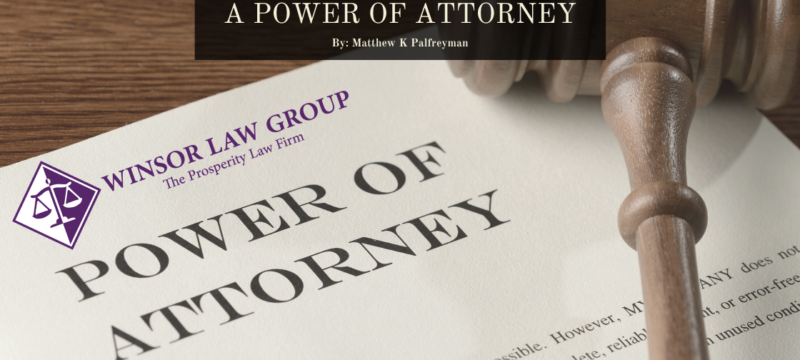
What is the Power in a Power of Attorney
- January 23, 2020
- Admin
- Comments Off on What is the Power in a Power of Attorney
By: Matthew K Palfreyman, Esq.
Everyone benefits from having a financial power of attorney for the simple reason that in order for a person’s financial affairs to continue to function with relative ease after a significant disability event, the only way to give someone the legal authority to act on your behalf without going through the court system is with a properly executed financial power of attorney. It is an extremely practical measure to avoid all the possible delays and expenses associated with Court involvement in your personal affairs. However, this does not mean that the execution of a power of attorney should be undertaken without serious consideration about what it means and for which it could be used.
The power of attorney is borrowed power. It is authorized in our system of government by state statute; however, powers of attorney were borne from the common law, which is a basic set legal principles based on tradition among the society of freed people. Rooted in the principle of agency, power of attorney is conceptually this: It is legal for a principal decision maker to delegate their authority to an agent, and an agent has capacity to bind the principal for matters within the scope of their agency. While relatively simple, the practical consequences of the exercise of that borrowed power in daily life is often misunderstood by the principals themselves, the agents, and institutions. This is especially true in dealing with consequences that come to bear for all three parties when an agency previous granted by a principal is reclaimed.
A principal-agent relationship fundamentally is no different than the relationship between a Company Board of Directors and an Executive Officer(s). Agents owe their principal solemn legal duties of good faith, fair dealing, and loyalty. The agent’s authority exists solely by consent of principal, which can be withdrawn at any time. Irrevocable powers of attorney do not, and cannot, exist. Agents can also be held accountable in court by the principal for abuses of their agency. The difficult reality many face is that the financial and other harms that came from appointing a bad agent often leave the principal alive, but effectively “out of business.” It should also be no surprise that death of the principal invalidates a power of attorney because the borrowed power dies with the person from whom it was granted.
Executing a general-durable power of attorney is in a very real sense the legal authorization for the appointed agent to borrow, and use, the keys to your kingdom. It is a very big and serious decision, best entered into with competent legal counsel. Still, powers of attorney are not all-powerful. While an institution is legally entitled to rely on a power of attorney, it is a grey area on whether they cannot also impose, on their own, separate, private requirements on their customers for the institution to accept and conduct on-going business with a customer’s agent. There have been whispers of such occurrences in my community.
I suspect as the digital life revolution, electronic fraud, and identify theft becomes more and more prevalent; institutions will be compelled to respond with such unique demands on customers. As personal interactions and personal business relationships with institutions fade, so also will the efficacy of old methods and mechanisms that maintain such relationships. These potential future challenges should not dissuade the general public from using the tool; for no other reason than the very real truth that having a current financial power of attorney is much cheaper and faster to take care of urgent life business than heading to Court to solve a decision making problem.
*The information provided in this article is of a general nature and reflects only the opinion of the author at the time it was drafted. It is not intended as definitive legal advice, does not create an attorney-client relationship, and you should not act upon it without seeking independent legal counsel.
